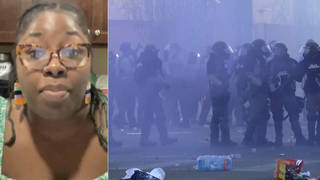
By Amy Goodman & Denis Moynihan
Nine minutes and 29 seconds. That’s how long Derek Chauvin, the former Minneapolis police officer now on trial for killing George Floyd, pressed his knee into Floyd’s neck last Memorial Day. Floyd was handcuffed, face down on the pavement, and not resisting as he gasped for air, begging for his life. Cell phone video, recorded by a teenager, sparked global protests demanding justice for George Floyd and an end to police brutality and systemic racism. Throughout the trial, we see George Floyd die, again and again, as different cell phone, surveillance and police body camera footage is played for the jury.
Eyewitnesses detail a modern-day lynching of an African American man by police in broad daylight. The testimony is a searing indictment of police violence, but also exposes another facet of our society that, despite the horrific circumstances, we should celebrate: the courage and compassion of passersby, taking risks by confronting armed police, desperately trying to save a stranger’s life.
“I heard George Floyd saying, ‘I can’t breathe. Please, get off of me. I can’t breathe,’ Darnella Frazier testified. She was only 17 years old when she recorded officers Derek Chauvin, J. Alexander Keung and Thomas Lane pinning Floyd down, and Tou Thao shielding them, all robbing him of life.
Darnella continued, “He cried for his mom. He was in pain…It seemed like he knew it was over for him. He was terrified. He was suffering. This was a cry for help….When I look at George Floyd, I look at my dad, I look at my brothers, I look at my cousins, my uncles, because they are all Black…that could have been one of them.”
Throughout Darnella’s video, we hear Donald Williams, an African American mixed martial artist, as he implores the officers to get off of Floyd’s neck.
“He’s not responsive now bro! …Check his pulse!” Trained in the use of chokeholds, Williams yelled at Chauvin to relent in his use of a “blood choke.” He said it was only then that Chauvin made eye contact with him in response to the term, signaling Chauvin knew what he was doing.
The prosecutor asked Williams about a 911 call he placed after George Floyd’s body was removed in an ambulance: “I did call the police on the police because I believe I witnessed a murder,” Williams explained.
Genevieve Hansen, a white firefighter and Emergency Medical Technician with the Minneapolis Fire Department, was off-duty and out for a walk when she witnessed Chauvin on George Floyd’s neck. She described her attempts to intervene:
“I identified myself right away, because I noticed that he needed medical attention. It didn’t take me long to realize that he had an altered level of consciousness. In our training, that is the first time that somebody needs medical attention. So, my attention moved from Mr. Floyd to how can I gain access to this patient and give him medical attention or direct the officers…the officers didn’t let me into the scene. In my memory, I offered to kind of walk them through it, or told them, ‘If he doesn’t have a pulse, you need to start compressions.’ And that wasn’t done, either.”
When prosecutor Matthew Frank asked her, “Are these things that you wanted to do?” Hansen replied, “It’s what I would have done for anybody…I pled and was desperate.” She wept.
Some of the most powerful testimony came from Charles McMillian, 60 at the time of the murder and among the first to stop. Police had already pulled a gun on Floyd, handcuffed him, and, despite Floyd’s pleading that he was claustrophobic, were manhandling him into the caged back seat of a squad car. “You can’t win,” McMillian shouted, to which Floyd yelled back, “I’m not trying to win!” It was the last conversation George Floyd would ever have. “When the cuffs are on, it’s over,” McMillian testified, breaking down in tears.
“The crowd was restrained, but only because the police restrained them,” Mel Reeves, community editor at the Minnesota Spokesman-Recorder, the state’s oldest African American-owned newspaper, said on the Democracy Now! news hour.
Darnella Frazier testified, “It’s been nights I stayed up apologizing and apologizing to George Floyd for not doing more and not physically interacting and not saving his life.” Each witness bears the trauma caused by seeing George Floyd’s murder.
The deep potential for goodness in humanity is on display at the trial, in stark juxtaposition to the cruelty of Derek Chauvin and the other officers. Ultimately, the kindness of strangers won’t stop police violence. Enforceable laws and a radical revisioning of policing are a start, and those won’t happen on their own. Mass movements and grassroots organizing are key elements to forcing systemic change.












Media Options